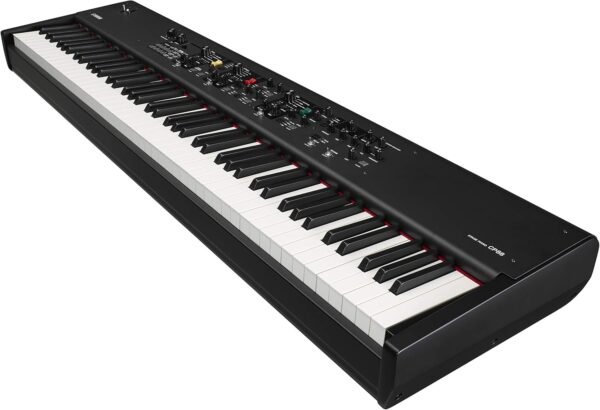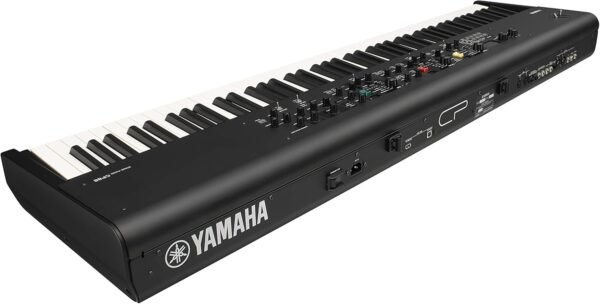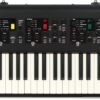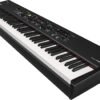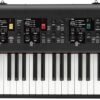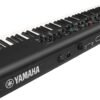Yamaha CP88 88-Key Stage Piano review premium sound and hammer action keys
Yamaha CP88 88-Key Stage Piano review premium sound and hammer action keys
- The keys feel incredibly realistic with their natural wood construction and synthetic ebony and ivory tops, offering a truly authentic playing experience.
- The graded hammer action provides a smooth transition in weight from lower to higher keys, making it ideal for both beginners and professionals.
- Seamless Sound Switching lets you change tones mid-performance without any interruption, enhancing live play versatility.
- The built-in delay, reverb, and EQ effects are easy to control in real-time, allowing for dynamic and expressive sound customization.
- Electric and acoustic piano sounds are rich and vibrant, making it perfect for a variety of musical genres.
As an Amazon Associate I earn from qualifying purchases.
Description
A Stage Piano That Feels Like an Acoustic Grand
The Yamaha CP88 88-Key Graded Hammer Action Stage Piano instantly grabbed my attention with its natural wood keys and synthetic ebony and ivory key tops. Playing it feels incredibly authentic, almost like sitting down at a high-end acoustic grand piano. The Graded Hammer (GH3) Action is a standout feature, as it replicates the weighted feel of traditional pianos, making it perfect for both seasoned pianists and those transitioning from acoustic instruments.
Even after hours of playing, I noticed the keys remained comfortable under my fingers, thanks to the textured key tops that prevent slipping. For anyone who values realistic key action, this stage piano delivers in spades. While testing it alongside other digital pianos, I found this one to consistently offer the best tactile experience.
Sound Selection That Inspires Creativity
What floored me about this piano is the three premium grand piano sounds, which include Yamaha’s flagship CFX and two other stunningly detailed options. There are also two upright pianos and five electric pianos, each with its own unique character. Whether I needed crisp, bright tones for classical pieces or warm, vintage vibes for jazz, the CP88 had my back.
The addition of Seamless Sound Switching makes it easy to transition between tones during live performances. I could hold notes while switching to a new sound without any interruptions—this feature is a game-changer for anyone performing live. The onboard master delay, reverb, and EQ effects allowed me to fine-tune my sound, and the dedicated real-time controls made adjustments intuitive. I felt like I was sculpting my ideal tone with minimal effort.
Highlights
- Natural wood keys with a realistic touch.
- Wide variety of grand, upright, and electric piano sounds.
- Seamless Sound Switching eliminates interruptions.
- Onboard effects with real-time controls for customization.
Downsides
- The size and weight make it less portable compared to other stage pianos.
- While the piano sounds are exceptional, the electric piano tones might not satisfy hardcore vintage enthusiasts.
- A higher price point may deter beginners.
Built for Performers
Having used this on stage, the robust build quality and professional-grade features stood out. The piano is housed in a sleek black chassis that screams durability. However, don’t expect it to be lightweight—this isn’t something you’ll want to lug around without help. Still, the design feels balanced, and everything from the knobs to the pitch bend lever is solidly built.
The FC3A sustain pedal included in the box deserves a mention too. It offers half-pedaling capabilities, which is perfect for nuanced classical pieces. I appreciated that Yamaha bundled a high-quality pedal instead of a basic one, as it makes a noticeable difference in performance.
Competing Products
Comparing the Yamaha CP88 to competitors like the Nord Stage 3, I noticed some clear differences. The Nord offers a broader range of synth sounds and more advanced layering options, but I found its interface less intuitive for quick adjustments. Meanwhile, Roland’s RD-2000 excels in versatility but lacks the same authentic key action that Yamaha provides.
For players focused on realistic piano sounds and a tactile experience, the CP88 shines. However, if you’re prioritizing portability or heavy synth features, alternatives like the Nord or Roland might be worth considering.
Value for Money
This digital piano sits in a premium price range, but the quality for price is undeniable. While it may not be the most budget-friendly option, its authentic key feel, high-quality sound samples, and performance-ready features justify the investment. For gigging professionals or serious musicians, this is an instrument that delivers on its promises.
Ultimately, as someone who values authenticity in touch and sound, the Yamaha CP88 has earned a permanent spot in my setup. It’s not perfect, but it’s as close as you can get for a stage piano in this league.


